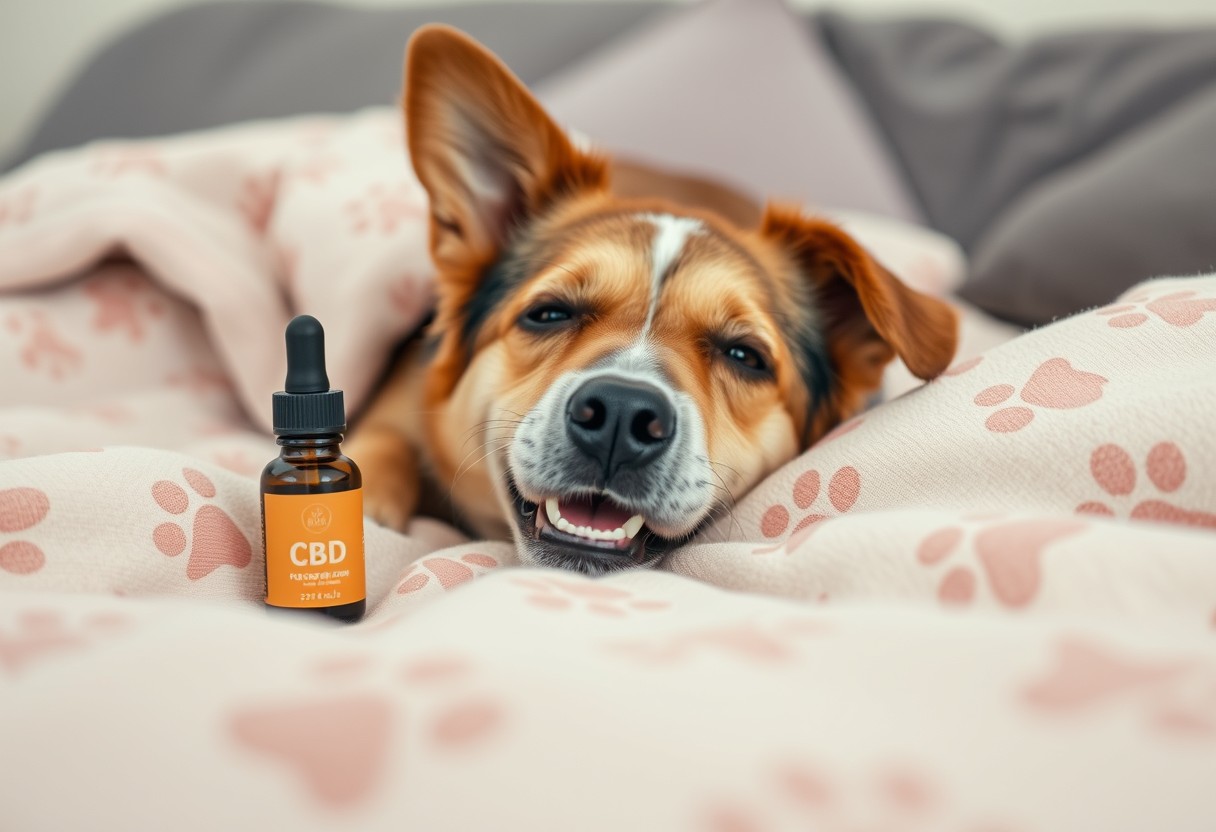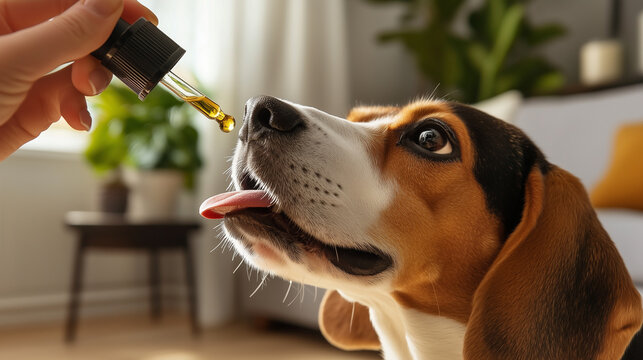A Beginner’s Guide To Using CBD For Pain Relief In Pets

Over recent years, the popularity of CBD as a natural pain relief option for pets has surged, leading many pet owners like you to explore its potential benefits. While CBD can provide significant relief for various conditions, understanding how to use it safely and effectively is crucial. This guide will empower you to make informed choices for your furry friend, addressing necessary practices and concerns. To dive deeper into the connection between CBD and Gabapentin For Dogs: Can Dogs Take CBD and …, ensure you read thoroughly and consult your veterinarian.
Key Takeaways:
- Consultation with a Veterinarian: Always discuss with your vet before starting CBD to ensure it’s safe and appropriate for your pet’s specific condition.
- Dosage Guidelines: Follow recommended dosage guidelines carefully to avoid any adverse effects, starting with a low dose and adjusting as necessary.
- Choose Quality Products: Select high-quality, pet-specific CBD products that are free from THC to ensure safety and effectiveness for your dog or cat.
1. Consult a veterinarian before using CBD for pets.
2. Choose pet-specific CBD products for safety and effectiveness.
3. Start with a low dosage to gauge pet’s reaction.
4. Monitor for side effects and adjust dosage as needed.
5. Keep CBD products stored safely and out of reach.
6. Research CBD brand reputation and third-party testing reports.

Understanding CBD
For many pet owners, understanding CBD (cannabidiol) is crucial when considering it as a natural remedy for pain relief in pets. Derived from the hemp plant, CBD is a non-psychoactive compound that interacts with the endocannabinoid system (ECS) in mammals, including your furry companions. This interaction can lead to various therapeutic effects, potentially providing relief from pain, anxiety, and inflammation without the intoxicating effects commonly associated with marijuana.
What is CBD?
One of the main compounds found in the cannabis plant, CBD, is known for its therapeutic properties without causing a “high.” Unlike THC (tetrahydrocannabinol), which is another well-known compound, CBD is safe for pets and does not have the same psychoactive effects. This makes it an appealing option for pet owners looking for alternative treatments for various health issues.
How CBD Works in Pets
On a biological level, CBD interacts with the endocannabinoid system, which plays a vital role in regulating many bodily functions in pets, including pain perception, mood, and immune response. By influencing cannabinoid receptors, CBD can help alleviate your pet’s discomfort and promote overall wellness.
Pets experience pain and stress just like humans, and their endocannabinoid system can significantly benefit from CBD. When you administer CBD to your pet, it binds to specific receptors in the ECS, which can reduce inflammation and manage chronic pain. Many pet owners report positive effects, including increased mobility and a calmer demeanor in their pets. However, it’s crucial to start with a low dosage and monitor for any adverse effects, as high doses may lead to undesirable outcomes. Always consult your veterinarian before introducing CBD to your pet’s regimen for safe and effective use.
Benefits of CBD for Pain Relief
Some pet owners have found that CBD can provide effective relief from various types of pain in pets. This natural compound interacts with the endocannabinoid system, promoting a sense of comfort and well-being. By potentially decreasing inflammation and enhancing your pet’s overall quality of life, CBD can be a valuable addition to your pet care regimen.
Types of Pain CBD Can Alleviate
- Chronic pain
- Arthritis-related discomfort
- Injury recovery
- Joint pain
- Neuropathic pain
Recognizing the specific type of pain your pet is experiencing is important when considering CBD as a treatment option.
| Type of Pain | CBD’s Potential Impact |
| Chronic Pain | Reduces pain sensations |
| Arthritis | Decreases inflammation |
| Injuries | Facilitates recovery |
| Joint Pain | Improves mobility |
| Neuropathic Pain | Alleviates discomfort |
Other Health Benefits
Pain is not the only issue that CBD can help with in pets; it also offers a range of other health benefits. CBD has been known to assist with anxiety reduction, promote better sleep, and support the overall well-being of your furry friends. Additionally, it may improve skin health and boost appetite, contributing to your pet’s holistic health.
Alleviate situational stress and worry in your pets by incorporating CBD into their routine. As you consider this natural remedy, keep in mind its potential to not only ease pain but also assist with anxiety, inflammation, and appetite stimulation. Always consult with your veterinarian before starting any new treatment to ensure it’s appropriate and safe for your pet’s specific health needs.
Choosing the Right CBD Product
Once again, selecting the appropriate CBD pet pain relief product for your pet can significantly impact their comfort and health. It’s vital to consider quality and ingredients before making your choice. For more insights, check out A Beginner’s Guide To CBD For Your Beloved Pets.
Types of CBD Products Available
Choosing from the variety of CBD products can be overwhelming. Here’s a breakdown of the common types:
| Tinctures | Liquid CBD extracts for easy dosage. |
| Edibles | Cannabinoid-infused treats for pets. |
| Topicals | CBD creams and balms for targeted relief. |
| Capsules | Easy-to-administer softgel forms. |
| Isolates | Pure CBD with no THC or other cannabinoids. |
After exploring your options, ensuring you select a product that meets your pet’s preference and needs is necessary.
Factors to Consider When Selecting
When choosing a CBD product for your pet, several factors can influence your decision:
- Source of CBD
- Third-party lab testing
- Concentration of CBD
- Type of product
- Pet’s specific needs
Recognizing these factors will help you make an informed choice.
Products can vary widely in quality and effectiveness. Always look for reputable brands that provide third-party testing, ensuring the product is free from harmful substances and contains the stated amount of CBD. The source of CBD can significantly impact its quality, so opt for products derived from organic, non-GMO hemp. To further ensure safety and efficacy, be mindful of your pet’s specific needs. Recognizing these will lead you to the right choice for your furry friend.
- Product consistency
- Ingredients list
- Usage instructions
- Customer reviews
- Legal compliance
Recognizing these aspects can significantly benefit your pet’s health journey.
Proper Dosage Guidelines
After determining that CBD may be helpful for your pet, it’s crucial to follow established dosage guidelines to ensure safety and efficacy. Start with a low dose and observe how your pet reacts before gradually increasing as necessary. Always consult your veterinarian for tailored advice, as proper dosing can vary based on factors such as your pet’s weight, age, and overall health. Your diligence in monitoring your pet’s response will play a key role in finding the right dosage.
Factors Influencing Dosage
One of the most important aspects of administering CBD is understanding the various factors that influence dosage. Consider the following:
- Weight of your pet
- Pet’s age and breed
- Overall health status
- Concentration of the CBD product
Knowing these factors will help you effectively tailor your CBD dosage for optimal results.
Recommended Dosage for Different Pets
Different pets may require varied dosages of CBD for effective relief. For dogs, a common starting point is 1-5 mg of CBD per 10 pounds of body weight, while cats generally need around 1-3 mg for a similar weight. Always adjust the dosage based on your pet’s specific needs, and be attentive to its behavior.
With an understanding of your pet’s unique needs, adjusting CBD dosage appropriately will lead to better outcomes. For smaller dogs and cats, you may start with just a few drops of oil, while larger dogs may benefit from a higher mg count. Monitor your pet closely, as too much CBD can lead to adverse effects, such as lethargy or upset stomach. Importantly, always consult with your veterinarian when determining a safe and effective dosage for your pet’s condition.
Safe Practices for Administration
Despite the growing popularity of CBD for pets, it’s crucial to practice safe administration. Always start with a low dose and consult a veterinarian familiar with CBD to ensure proper dosing for your furry friend. For detailed information, check out the CBD Dosing Guide For Dogs 2023. Your pet’s specific health needs should always come first, as each pet responds differently to CBD.
Methods of Administration
An effective way to administer CBD pet pain relief to your furry friend is through tinctures, treats, or capsules. Tinctures allow for precise dosing and can be mixed with food or given directly. Always choose high-quality, pet-safe products to ensure safety and efficacy.
Monitoring Your Pet’s Reaction
To ensure the safety and effectiveness of CBD for your pet, it’s necessary to monitor their reactions closely after administration. Start with a low dose and observe any changes in behavior or health.
Pets can react differently to CBD, so vigilance is key. Look for signs of excessive lethargy, unusual aggression, or any changes in appetite. Conversely, you might notice your pet responding positively with reduced pain and increased mobility. If you observe any adverse reactions, stop administration immediately and consult your veterinarian for guidance.
Legal Considerations
Keep in mind that the legal landscape surrounding CBD usage for pets can vary significantly from one jurisdiction to another. It’s imperative to research the laws in your area to ensure that using CBD for your pet’s pain relief is compliant. Additionally, always source your CBD products from reputable companies to avoid any legal complications.
Understanding the Legal Status of CBD
Any pet owner interested in using CBD should first recognize that the legal status of CBD products can be complex and varies by state and country. While some regions have legalized CBD derived from hemp, others may still categorize it similarly to marijuana. Always check local laws to ensure you’re abiding by regulations when considering CBD for your pet.
Regulation and Quality Control
Understanding the regulatory landscape for CBD products is crucial for pet owners. The lack of consistent federal regulations can lead to variations in product quality. You should look for products that are lab tested for purity and potency, ensuring that they are safe and effective for your pet. This will help you avoid products that may contain harmful impurities or incorrect dosages.
Legal regulations often fail to keep pace with the rapidly growing CBD market, which makes quality control a vital concern for pet owners. Not all products are created equal, and as a result, many may not meet safety standards. Seeking products from reputable manufacturers who adhere to third-party testing and transparent sourcing can help you gain peace of mind. Be sure to seek labels that indicate compliance with regulations to ensure you’re giving your pet a trustworthy product. This effort protects your pet’s well-being and promotes safer usage of CBD as a pain relief option.
To wrap up
So, as you consider using CBD for pain relief in your pets, it’s imperative to prioritize their safety and well-being. Start with a high-quality product, consult with your veterinarian, and observe your furry friend’s response. By following these guidelines and adjusting the dosage as needed, you can help manage your pet’s pain effectively while ensuring they remain comfortable and happy. Be mindful of, knowledge and caution are key to safely integrating CBD into your pet’s care routine.
FAQ
Q: What is CBD and how can it help with pain relief in pets?
A: CBD, or cannabidiol, is a compound derived from the hemp plant that interacts with the endocannabinoid system in both humans and animals. In pets, CBD has been found to have potential anti-inflammatory and analgesic properties, which can assist in alleviating pain associated with conditions such as arthritis, injury, or chronic pain. It’s important to note that while many pet owners report positive outcomes, research is still ongoing to fully understand the extent of its effects and benefits.
Q: How do I determine the proper dosage of CBD for my pet?
A: Determining the right dosage of CBD for your pet can depend on several factors, including their size, weight, the severity of their condition, and the concentration of the CBD product. As a general starting point, pet owners are advised to begin with a low dosage—typically 1-2 mg of CBD per 10 pounds of body weight—and monitor their pet’s response over time. It is imperative to consult with a veterinarian who is knowledgeable about CBD to help tailor the dosage to your pet’s specific needs. Adjustments can be made based on their reactions and required relief level.
Q: Are there any risks or side effects associated with using CBD for pets?
A: While CBD is generally considered safe for pets, there can be potential side effects. Some pets may experience drowsiness, dry mouth, or changes in appetite. In rare cases, a pet may have an adverse reaction, such as gastrointestinal upset or allergic reactions. It’s crucial to choose high-quality, third-party tested products to minimize risks and to always consult with your veterinarian before introducing CBD to your pet’s regimen. By doing so, you can ensure both safe and effective use for CBD pet pain relief.














